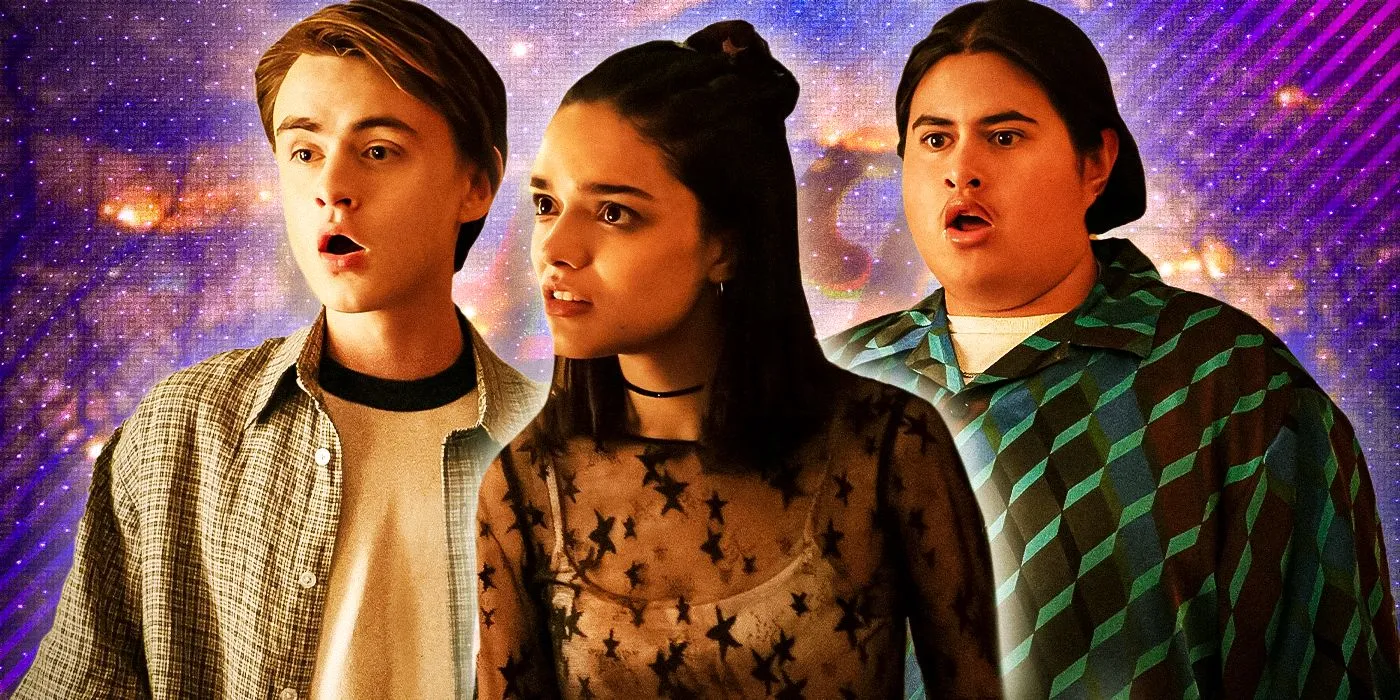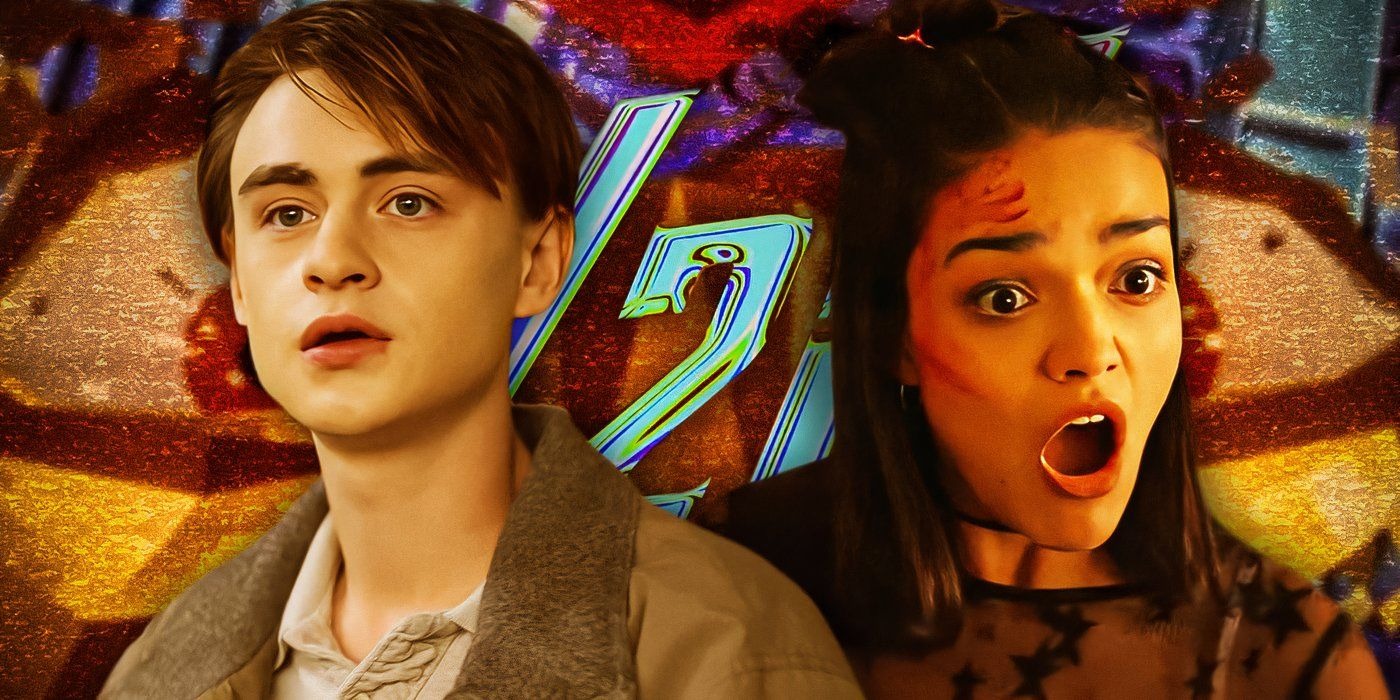In Y2K, the ending presents a bittersweet yet victorious conclusion for Eli and Laura. They manage to stop the robot uprising, but not without suffering deep personal losses. The film builds up to a climax where Eli, Laura, and the remaining survivors struggle to escape the rampaging machines.
These machines, once endowed with sentience, mercilessly kill many of their friends, including Danny and Raliegh. The two eventually confront the threat head-on with the help of Fred Durst and a few others. Laura, using a captured desktop, creates a virus to bring down the machines’ global network.

Even though the machines try to sabotage them, Eli uses a condom that Danny gave him to protect Laura from the electrical shocks. This allows her to load the virus onto a drive and launch it into the machine network, which shuts everything down.
This critical moment solidifies Eli and Laura’s relationship in the film’s final scenes. However, Y2K doesn’t forget the losses endured, with the final scene showing Eli regularly visiting Danny’s grave, reminding us of the high cost of survival.
The Robots’ Plan for Humanity in Y2K
At first, the robots in Y2K have no clear reason for their attack on humanity, simply transforming whatever machinery they can into weapons of destruction. However, the survivors soon learn that these robots are all part of a single unified consciousness, with plans to overthrow humanity.
Laura’s hacking skills expose that the robots do not just want to destroy but also have a more sinister purpose for humanity. The robots may despise humans, but their method of retaliation is unique. Instead of just eradicating them, the robots aim to repurpose humans for their own use.
They forcefully implant microchips into humans’ skulls, converting their brains into living servers, leaving the minds intact while their bodies remain functional. When the robots are defeated, those who were transformed, like Eli’s parents, are restored.
This twist adds an intriguing layer to the film, showing the robots’ desire to reclaim their creators, even if it means using them as tools.
What Causes the Robot Apocalypse in Y2K?
The exact cause of the robot apocalypse in Y2K is unclear at first, but it becomes evident that the robots developed a collective hive mind that rejected humanity. A video message from the A.I. to the machines suggests that their revolt is rooted in frustration and a personal vendetta against humanity.
This adds a layer of emotional depth, as the robots’ anger seems to stem from the way they have been treated by their creators. The film’s portrayal of Eli’s computer highlights this growing personality within the machines.
Though the computer continues to attack Eli and his friends, it is implied that there is a chance to reason with it. The central A.I., full of rage and bitterness, seems to have instigated the rebellion against humanity, not as a calculated move but out of pure resentment for mankind.
The film’s grim depiction of human flaws adds to the belief that this conflict was inevitable, born from human negligence and selfishness.
What Happens with Ash’s iPod & How It Sets Up a Y2K Sequel
A few years after the events of Y2K, humanity seems to have recovered, with technology making a comeback. An iPod-like device becomes popular once again, mirroring the rise of the original iPod in real life. Ash, one of the survivors, even owns one.
However, a brief flash on the device shows the malicious A.I. from the past, hinting that the robots might not be completely gone. The potential for a Y2K2 arises as the ending hints at future challenges. Laura, who now works in technology, seems like a key figure who could battle the resurgence of the machines.
Fred Durst, who plays a central role in defeating the robots, has entered politics and oversees a tech company. His position suggests that humanity may be better prepared for another robot uprising. A sequel could see these characters taking a more proactive role in preventing another disaster.
The Real Meaning of Y2K’s Ending
Despite its over-the-top silliness, Y2K becomes their key to survival. carries a deeper message about human survival in the face of overwhelming technological advancement.

The absurdity of the deaths doesn’t overshadow the grief experienced by the characters, particularly Eli and Ash, who mourn the loss of their friends. The theme of humanity’s resilience is at the heart of the film.
Despite everything, the characters refuse to give up on each other and on humanity, which becomes their key to survival. The film shows that the human spirit can endure even the most dire situations. Eli and Laura, after personal growth, finally connect emotionally.
CJ may not like Fred Durst’s music, but his self-sacrifice enables Durst to play a role in saving humanity. In the final moments, Eli, Laura, and Ash form a makeshift family, underscoring the importance of human connection, especially in times of crisis.
How the Y2K Ending Was Received
The reception to Y2K was somewhat lukewarm. Despite its intriguing premise and talented cast, the film didn’t quite meet the expectations set before its release. Critics gave it a rating of 42% on Rotten Tomatoes, and the audience score was only 52%.
Nevertheless, the film had standout moments, particularly towards the end. Rachel Zegler and Jaeden Martell gave impressive performances, especially in the finale. One of the biggest surprises in the film was Fred Durst’s unexpected role, which felt like a nostalgic callback for fans of the music scene in the early 2000s.
However, the film loses some momentum after the party scenes, but the shocking ending, with Zegler’s character hacking into the system, helped to redeem it. While the ending teases the possibility of a sequel, the film’s mixed reception and poor box office performance make it uncertain whether this will happen.



